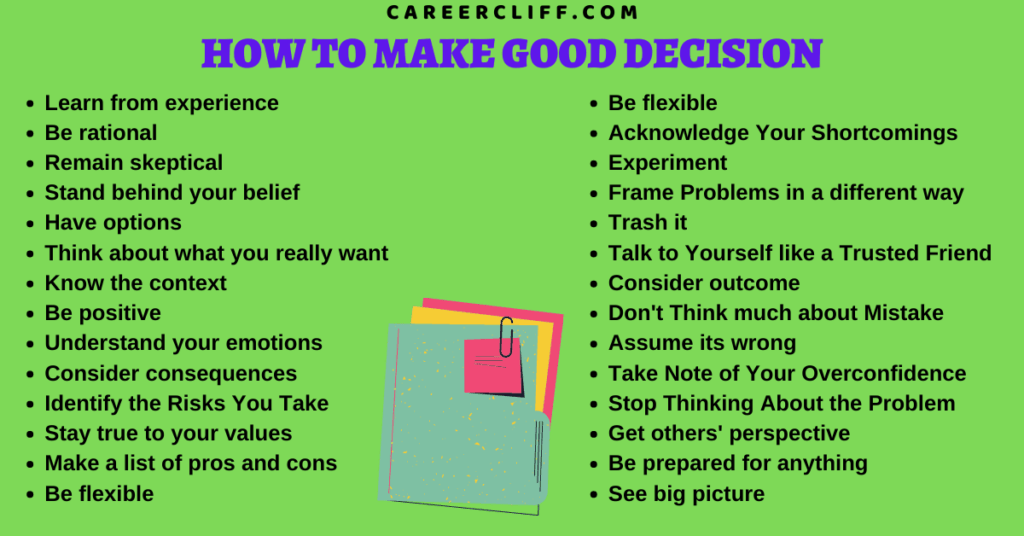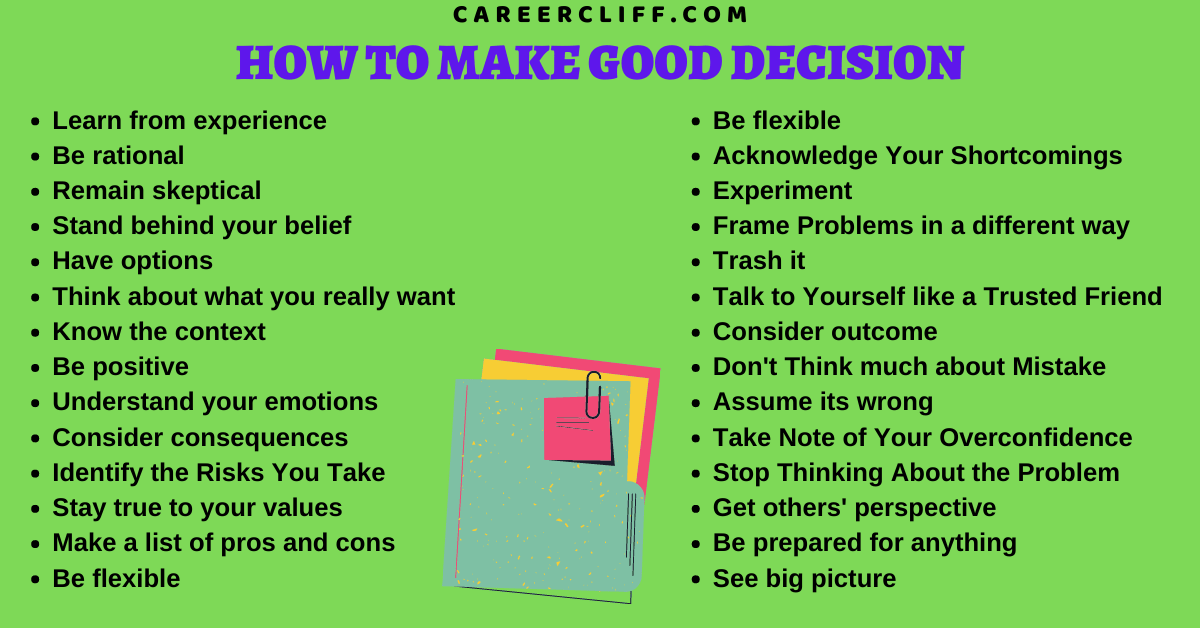
Making Wise Decisions: A Guide to Better Choices
Every day, we are faced with a multitude of decisions, from the mundane to the monumental. Whether it’s choosing what to eat for breakfast or deciding on a major career change, the ability to make wise decisions is crucial for navigating life successfully. This article delves into the art of making wise decisions, providing a framework and practical strategies to enhance your decision-making process.
Understanding the Importance of Decision-Making
Decision-making is the cognitive process of selecting a course of action from multiple alternatives. It’s a fundamental aspect of human behavior and plays a significant role in shaping our lives. Good decisions can lead to positive outcomes, such as increased happiness, success, and fulfillment. Conversely, poor decisions can result in negative consequences, including regret, failure, and missed opportunities. Learning how to make wise decisions is therefore an investment in your future.
The impact of decisions extends beyond personal well-being. In professional settings, effective decision-making is essential for leadership, innovation, and organizational success. Leaders who consistently make wise decisions inspire confidence and drive their teams towards achieving common goals. In personal relationships, thoughtful decision-making fosters trust, understanding, and mutual respect.
The Psychology Behind Decision-Making
Our brains are wired to make decisions quickly, often relying on heuristics, or mental shortcuts, to simplify complex situations. While these shortcuts can be helpful in certain contexts, they can also lead to biases and errors in judgment. Understanding the psychological factors that influence our decision-making is crucial for making wise decisions.
Cognitive Biases
Cognitive biases are systematic patterns of deviation from norm or rationality in judgment. Some common cognitive biases include:
- Confirmation Bias: Seeking out information that confirms pre-existing beliefs and ignoring contradictory evidence.
- Availability Heuristic: Overestimating the likelihood of events that are readily available in memory.
- Anchoring Bias: Relying too heavily on the first piece of information received when making decisions.
- Loss Aversion: Feeling the pain of a loss more strongly than the pleasure of an equivalent gain.
Being aware of these biases can help you mitigate their influence on your decision-making process. By actively challenging your assumptions and seeking out diverse perspectives, you can make more objective and informed choices. [See also: Overcoming Cognitive Biases in Decision Making]
Emotional Influences
Emotions play a significant role in decision-making. While emotions can provide valuable insights, they can also cloud judgment and lead to impulsive decisions. It’s important to recognize the influence of emotions on your thought process and to avoid making important decisions when you are feeling overly stressed, angry, or upset. Learning to manage your emotions effectively is a key component of making wise decisions.
A Framework for Making Wise Decisions
While there is no one-size-fits-all approach to decision-making, a structured framework can help you navigate complex choices more effectively. Here’s a step-by-step guide to making wise decisions:
Define the Problem or Opportunity
Clearly identify the issue you are trying to address or the opportunity you are trying to seize. What are the specific goals you hope to achieve? The more clearly you define the problem, the easier it will be to generate potential solutions. Ask yourself clarifying questions to fully understand the scope and context of the decision. Making wise decisions starts with a clear understanding of the situation.
Gather Information
Conduct thorough research to gather relevant information about the problem or opportunity. This may involve consulting with experts, reviewing data, or conducting experiments. The more information you have, the better equipped you will be to evaluate your options and make an informed decision. Don’t rely solely on your own assumptions or biases. Seek out diverse perspectives and challenge your own beliefs. This is crucial for making wise decisions.
Generate Alternatives
Brainstorm a range of potential solutions or courses of action. Don’t limit yourself to obvious choices. Encourage creativity and consider unconventional approaches. The more alternatives you generate, the greater the likelihood of finding an optimal solution. This step is about exploring all possibilities before narrowing down your choices. This is a critical step in making wise decisions.
Evaluate Alternatives
Assess the pros and cons of each alternative, considering both short-term and long-term consequences. Use a decision matrix or other tool to systematically compare the different options. Consider the potential risks and rewards associated with each choice. Be objective and avoid letting your emotions cloud your judgment. This thorough evaluation is fundamental to making wise decisions.
Make a Decision
Based on your evaluation, select the alternative that best aligns with your goals and values. Be confident in your decision and commit to taking action. Don’t second-guess yourself or get bogged down in analysis paralysis. Trust the process and move forward with conviction. This is the moment where careful consideration leads to making wise decisions.
Implement the Decision
Put your decision into action and monitor the results. Be prepared to adjust your course if necessary. Decision-making is an iterative process, and it’s important to learn from your experiences and refine your approach over time. This step is about translating your decision into tangible outcomes. Even after making wise decisions, implementation requires vigilance.
Evaluate the Outcome
After implementing your decision, take time to evaluate the results. Did you achieve your goals? What did you learn from the experience? What could you have done differently? Use this feedback to improve your future decision-making. This reflection is essential for continuous improvement and making wise decisions in the future.
Practical Strategies for Enhancing Decision-Making
In addition to the framework outlined above, there are several practical strategies you can use to enhance your decision-making skills:
- Seek Diverse Perspectives: Talk to people with different backgrounds and viewpoints to gain a broader understanding of the issue.
- Consider the Long-Term Consequences: Don’t focus solely on immediate gratification. Think about the long-term impact of your decisions.
- Manage Your Emotions: Avoid making important decisions when you are feeling overly stressed, angry, or upset.
- Break Down Complex Decisions: Divide large, complex decisions into smaller, more manageable steps.
- Learn from Your Mistakes: Don’t be afraid to admit when you’ve made a poor decision. Use it as an opportunity to learn and grow.
- Practice Mindfulness: Being present in the moment can help you make more rational and thoughtful decisions.
The Role of Intuition in Decision-Making
While data and analysis are important, intuition can also play a valuable role in decision-making. Intuition is the ability to understand something instinctively, without conscious reasoning. It’s often based on past experiences and subconscious processing. Trusting your gut feeling can sometimes lead to making wise decisions, especially in situations where information is limited or ambiguous.
However, it’s important to distinguish between genuine intuition and impulsive reactions. Intuition should be used as a complement to, not a substitute for, careful analysis and evaluation. By combining both analytical thinking and intuitive insights, you can make more well-rounded and effective decisions. This balance is key to consistently making wise decisions.
Ethical Considerations in Decision-Making
Ethical considerations should always be a part of the decision-making process. Consider the potential impact of your decisions on others, and strive to make choices that are fair, just, and responsible. Avoid actions that could harm or exploit others, even if they are legal or profitable. Making wise decisions involves considering the ethical implications of your choices.
Integrity is essential for building trust and maintaining a positive reputation. By adhering to ethical principles, you can ensure that your decisions are aligned with your values and contribute to the greater good. This is a crucial aspect of making wise decisions in both personal and professional contexts.
Conclusion
Making wise decisions is a skill that can be developed and refined over time. By understanding the psychology behind decision-making, using a structured framework, and employing practical strategies, you can improve your ability to make sound judgments and achieve your goals. Remember that decision-making is an ongoing process, and it’s important to learn from your experiences and continuously strive to improve. Embrace the challenge of making wise decisions, and you will be well on your way to a more fulfilling and successful life. The ability to make wise decisions is truly a cornerstone of success and happiness. Consistently making wise decisions will lead to a better future. Continue practicing making wise decisions to hone your skills. Start making wise decisions today!

